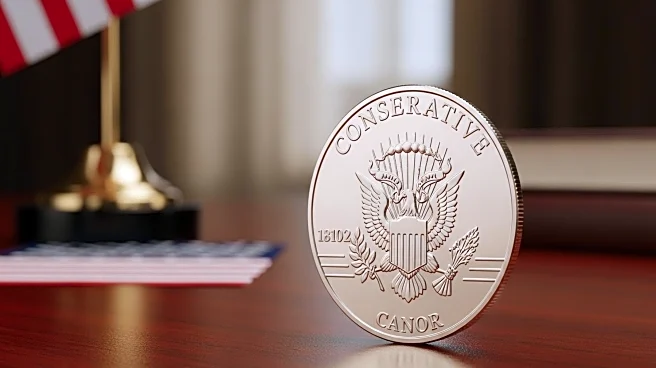What is the story about?
What's Happening?
Two Republican lawmakers have announced plans to introduce legislation that would honor the late conservative activist Charlie Kirk by printing his image on nearly half a million new silver dollar coins. Kirk was fatally shot during an event at Utah Valley University on September 10. The proposed bill calls for the U.S. Treasury to mint 400,000 silver dollar coins featuring Kirk's face and the message 'Well done, good and faithful servant.' The coins would be dated 2026 and include Kirk's full name. This initiative is part of a broader effort to commemorate Kirk's legacy, which includes other legislative proposals such as establishing a national day of remembrance on his birthday.
Why It's Important?
The proposal to feature Charlie Kirk on U.S. currency underscores his influence within conservative circles and the impact of his untimely death. If passed, the legislation would make Kirk the youngest American immortalized on legal U.S. currency, a significant departure from the tradition of featuring historical figures. This move reflects the deep admiration and respect he garnered among his supporters and highlights the ongoing efforts to preserve his legacy. The initiative also raises questions about the criteria for commemorative currency and the role of political figures in shaping such decisions.
What's Next?
The proposed bill will undergo the standard legislative process, which includes discussions and potential amendments before it can be passed into law. The initiative may face scrutiny regarding the appropriateness of featuring a contemporary political figure on currency, given existing laws that bar living individuals from such honors. Stakeholders, including political leaders and the public, will likely engage in debates over the cultural and historical implications of this proposal.
Beyond the Headlines
The proposal to honor Charlie Kirk with a commemorative coin may spark discussions about the intersection of politics and cultural memory. It raises ethical considerations about the selection of individuals for national honors and the potential for political motivations to influence such decisions. Additionally, it could set a precedent for future commemorative initiatives, potentially altering the landscape of how public figures are memorialized in the U.S.
















